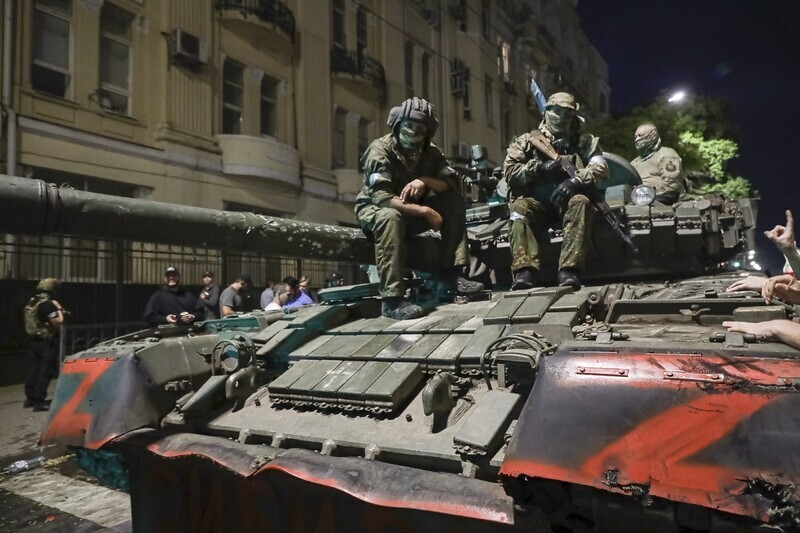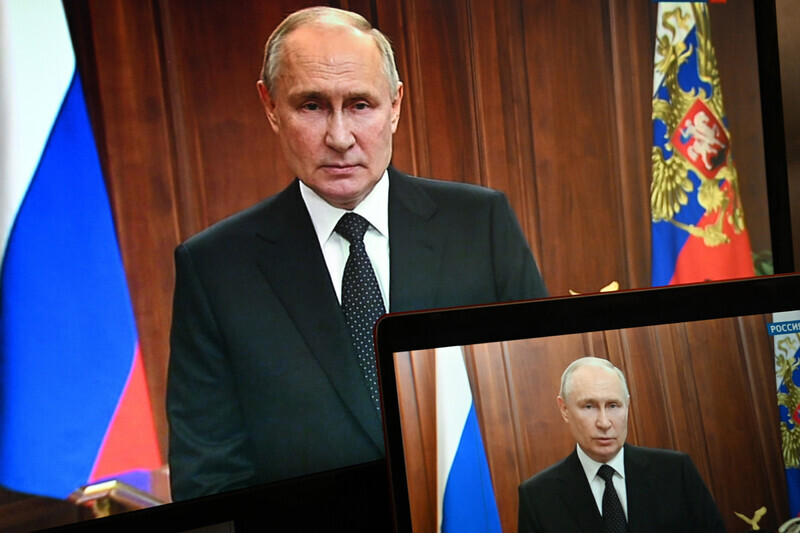hankyoreh
Links to other country sites 다른 나라 사이트 링크
[Column] The failure that brought on the Wagner mutiny isn’t Putin’s alone


Ukraine and Russia’s ongoing conflict is a war between mercenaries. The Wagner Group’s romp through western Russia last weekend demonstrated that it’s a political entity and a military force capable of independent military operations. Both in its fighting prowess and its brutality that ignores the constraints of the law of war, the Wagner Group is a step above Russia’s regular forces.
Following its capture of the city of Bakhmut in eastern Ukraine last year, Wagner was elevated into a heroic force that gained popular support in Russia.
For a long time now, Wagner has been building a global network of violence based on funds channeled from subcontractors of Russian state-run energy giant Gazprom and rights and interests controlled in the Middle East and Africa. The group is also adept at popular media and the Internet and even interfered in the US presidential election in late 2020. In short, Wagner is equipped to wage not only conventional military operations but also biological and chemical warfare, ideological warfare, cyber warfare and psyops.
Wagner isn’t the only mercenary force active in Russia. It’s prime time for private armies: there’s the 30,000-strong force controlled by Ramzan Kadyrov, the leader of Chechnya; the Patriot Group, which is personally controlled by Russian Defense Minister Sergei Shoigu; and Convoy, which was founded by a former Wagner commander who struck out on his own.
Russian journalist Konstantin Remchukov told the British press in an interview last year that the profusion of heavily armed private armies was a bigger facet of the war than the mere question of victory or defeat. In the future, Remchukov predicted, there would be constant squabbles between armed factions.
That’s what political scientist Andrey Piontkovsky calls “military feudalism.” State failure will lead to a medieval order teeming with armed clans, Piontkovsky says.
In a press interview, Russian mafia boss Grisha Moskovsky spoke of the birth of two monstrous gangs, referring to the Wagner Group and Kadyrov’s army.
The swarm of private military organizations outside the state’s control reveals the failure of the Russian state, but the US and the West are no strangers to this phenomenon. If anything, the West is worse in the sense that its corporations, rather than regular armies, are orchestrating the war.
US facial recognition firm Clearview AI carried out a major operation in Ukraine last year after acquiring around 100 million facial photographs from Russian social media accounts. Its photograph search engine can identify the corpses of Russian soldiers even when severely disfigured within a few minutes with over 95% accuracy.
That information is then communicated to volunteer members of the Ukrainian intelligence service who have been recruited from around the world. They infiltrate Russian social media to inform friends and family members of soldiers’ deaths even faster than the Russian government and arrange for the Ukrainian government to return the bodies.
Since the US government threw up its hands at the beginning of the war, American companies have basically dominated all aspects of warfare. Elon Musk’s Starlink provides a communications network for the Ukrainian state and troops, Uber taxis move around weaponry and other supplies, and Microsoft handles cyber warfare. Meanwhile, privately controlled satellites — which are far superior in number and performance to the government’s military satellites — provide real-time information about movements by Russian forces.
Such steps didn’t require any official procedures — not a declaration of war, not even congressional approval.

This corporate war began outside the authority of the state, and the US and NATO only stepped in later. Elon Musk has already transcended the traditional role of a businessperson, assuming the position of international strategist and diplomat by making a personal proposal for ending the war.
In a recent meeting with Microsoft founder Bill Gates, Chinese President Xi Jinping described Gates as his “first American friend” to visit him and had the businessman sit beside him. Compared to the more modest seat prepared for US Secretary of State Antony Blinken in a meeting a few days later, Gates would appear to be on the level of a national leader. That suggests that China also regards the Big Tech behemoths as independent actors.
The Western media drone on about the political crisis Putin is facing given his failure to control private mercenary groups. But I posit that the time has come to ask whether the US government is controlling the war being waged by its private companies.
The battle to control tech giants’ big data and AI through government policy or institutions was lost long ago. Those self-same companies have been persistently preaching the gospel of freedom from government regulations.
Furthermore, private mercenary groups in the modern world didn’t originate in Russia, but in the US, during the Iraq War. The economic value created by private military corporations during the so-called war on terror was US$350 billion (through 2018), seven times the South Korean government’s current defense budget.
Our future is a world ruled by mighty corporations, a world in which state and government functions are in decline. We should be talking about the failure not of Putin, but of modern governments in general.
Are we ready to adapt to corporate rule?
Please direct questions or comments to [english@hani.co.kr]

Editorial・opinion
![[Column] Is Korean democracy really regressing? [Column] Is Korean democracy really regressing?](https://flexible.img.hani.co.kr/flexible/normal/500/300/imgdb/original/2024/0705/2917201664129137.jpg) [Column] Is Korean democracy really regressing?
[Column] Is Korean democracy really regressing?![[Column] How tragedy pervades weak links in Korean labor [Column] How tragedy pervades weak links in Korean labor](https://flexible.img.hani.co.kr/flexible/normal/500/300/imgdb/original/2024/0703/8717199957128458.jpg) [Column] How tragedy pervades weak links in Korean labor
[Column] How tragedy pervades weak links in Korean labor- [Column] How opposing war became a far-right policy
- [Editorial] Korea needs to adjust diplomatic course in preparation for a Trump comeback
- [Editorial] Silence won’t save Yoon
- [Column] The miscalculations that started the Korean War mustn’t be repeated
- [Correspondent’s column] China-Europe relations tested once more by EV war
- [Correspondent’s column] Who really created the new ‘axis of evil’?
- [Editorial] Exploiting foreign domestic workers won’t solve Korea’s birth rate problem
- [Column] Kim and Putin’s new world order
Most viewed articles
- 1[Column] Is Korean democracy really regressing?
- 2Real-life heroes of “A Taxi Driver” pass away without having reunited
- 3Beleaguered economy could stymie Japan’s efforts to buoy the yen
- 4What will a super-weak yen mean for the Korean economy?
- 5Car behind deadly crash began rapid acceleration after exiting underground garage
- 6‘No specific purpose’: Experts on how Big Tech attempts to create demand for AI
- 7[Editorial] Chun Doo-hwan: Gone but never to be forgiven
- 8Experts cast doubt on driver’s claim that sudden unintended acceleration caused deadly crash
- 9South Koreans living near border with North unnerved by return of artillery thunder
- 10Shoddy records help Korean hospitals conceal abuse of mentally ill